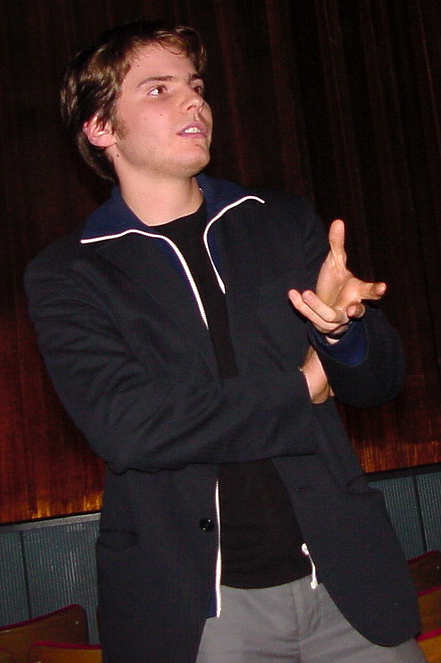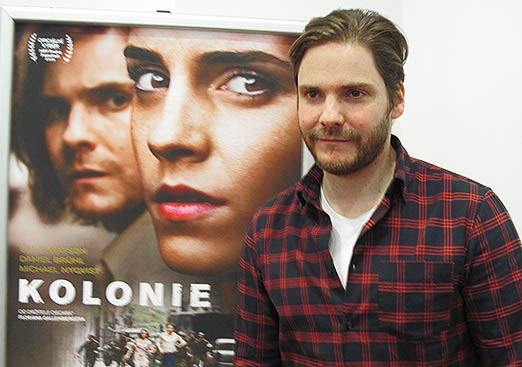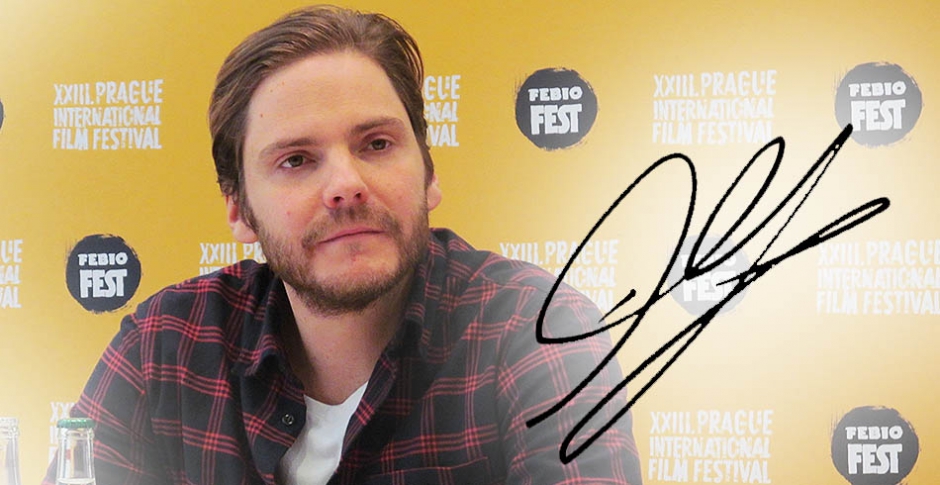Daniel Brühl: It is nice when film helps to change for better something in the world.
Written by Eva Csölleová, Vítek FormánekThe main star of FebioFest 2016 was German actor Daniel Brühl. Despite having many awards under his belt and starring in films in Europe and America, he has both feet on the ground. He can be described as intelligent Mr. Nice Guy. He speaks six languages and is still modest, approachable and friendly. Generally a pleasure to deal with.

Was it your father´s influence which brought you to film business? If we are correct, he was established documentary director, wasn´t he?
Yes, he was and obviously I loved what he was doing, it was very exciting. I started to act as a small boy. I liked to pretend, to get attention. I was very good at playing dead in the bathroom, my mum was always scared but I thought it was fun. I was in kid´s agency and got some part in one kid´s film and earned my first money for which I bought a mountain bike. I knew from that time that acting was exactly what I wanted to do and I worked on it. I was acting in two student films and even got some accolade for them. Then these films got lots of attention in Germany on festivals. Next movie was „Good bye Lenin“ which was a kick-off for me and my acting career.
Why do you think this film was such a hit? Was it because it was so well written, made and portrayed or because of exotic topic of Communist DDR and its funny aspects?
I believe it was made at the right time. It was some 10-13 years after Fall of Berlin Wall and there was some kind of nostalgia, people were comparing their lives then and now. Had it been shot just after the Fall of the Wall, it wouldn´t interest anyone. Had it been shot now, it would flop too, since now Germany face different problems. So I believe it was made and released at the right time which is sometimes very important in film business.
You speak six languages, which is amazing. Do you think it has some impact on the fact that you get offers from various parts of the world?
You know, my mum in Spanish, father is German so both languages are natural to me and that is how we speak at home. I was raised in a French family in Germany, so French is also natural to me. English is international language so it´s a must, so I don´t have language problems at all and yes I think it is a bonus for my job. After the success of the movie „Good bye, Lenin“ I got an offer to play a foreigner washed out on shore in a movie „ Ladies in Lavender“ since I didn´t have any accent, it fit perfectly.
 Your film „Rush“ made a star from you. Could you reveal how did you get the job and what was your preparation for that?
Your film „Rush“ made a star from you. Could you reveal how did you get the job and what was your preparation for that?
There is one funny story connected with how I got a part in it. I was driving a car behind a truck in Spain and my girlfriend didn´t like the way I drove, telling me “Do you think you are a rally driver? So back up!“ At that moment I got a call from my agent telling me I got the part in the film. My hands were shaking when I saw Niki´s number on my phone later on. He told me “I guess we have to meet, so come to Vienna and just bring the hand luggage, so if we don´t like each other you can piss off“. So I went to Vienna and thankfully chemistry worked between us so I had to buy some more clothes cos I stayed in Vienna for longer period. Niki is very reserved person and he is not a friend with everybody. But he told me not to worry to ask him anything I want to know, about fear and accident. One time he took me to a dinner with his new wife and at that time called his ex–wife Marlene. So we all went to restaurant and she told me a lot about that period, which was very important for me. I hired a language coach who taught me a Viennese accent for four weeks. I also underwent a training course in Formula Three to get a feel of these cars. Then Niki took me by his private plane to Sao Paolo and introduced me to Grand Prix world. I met Sebastian Vettel, Nico Rosberg and also Nelson Piquet and even Jackie Stewart. I got a feel of that world and knew the difference between those guys from 70´s and those from these days.
And what about actual shooting?
I had to get up at 3 a.m.since they had to make prosthetic amendments to my teeth to look like Niki, it took seven hours every day. Chris, who played James Hunt could come at 10 a.m. Ron Howard has a sense for each detail so the accident was filmed at the very place at the very corner of real one. Niki was always on the phone so when I wasn´t sure with anything like if he put gloves or helmet first, I phoned him. Once I had to tell an insult which didn´t go from my mouth and I had difficulties with it. So I called him and he game me whole list of different insults so I could choose which was suitable for me. When he saw the first takes, he called me and said he likes it which gave me a big confidence.
 To impersonate living legend is no mean feat.How did Niki Lauda react when he saw the movie?
To impersonate living legend is no mean feat.How did Niki Lauda react when he saw the movie?
Ron made a screening for the drivers and the actors on Nürburgring and it got standing ovation.I sadly couldn´ t have been there. Niki knew nothing about his accident, the memory was erased so actually he saw on the screen how close he was to death.He phoned me and said he couldn´t sleep that night how he was moved.It was the biggest award for me for that part when Niki told me he liked it. He once phoned me and asked“ Was I really such a bastard?“
You played in films of renowned American directors such as Ron Howard or Quentin Tarantino.How did you like working with them and would you like to act in America?
I had ambivalent feelings towards Tarantino at the start. I was happy and frightened at the same time. He invited me for a dinner before audition and I knew he knows a lot about movies so I was well prepared for him. He liked my film „ Good bye, Lenin“ and he remembered my face which was good. Once he wanted to shoot my part in French but didn´t have French script so far. So I told him that it´s not a problem for me that I can translate my part, but since my French is not 100% I didn´t know some words so I used Spanish ones instead and he didn´t notice it, ha,ha. The film „Inglorious Basterds“ put into shop window many of involved actors. I think each actor has such a milestone in his career which moves him forward. Ron Howard was great and I loved him within few minutes. I appreciated he called me immediately when I got my part, not leaving me grilling in doubts for next days as directors normally do it. I was shooting in America but I have no desire to live there. I am European and to be honest feel homesick when I am away for longer time. Thankfully, lots of American film companies also operate in London so I can shoot there. Short time ago I was working on a movie „Captain America“ and we were based in Atlanta. Well, nothing personal against anybody from Atlanta, but sometimes we had no job for few days and I was bored to death there. Also when I was working in LA I saw what the actresses have to go through to keep in shape, hide their aging and keep their job. That was horrible. I think it is much easier in Europe and also for us men, the aging looks better, we are more charming and mature, ha ha.
On FebioFest 2016 in Prague you introduced in Czech premiere your new movie „Colonia“-What led you to accept the role in this movie and was it something more for you than just a job?
I was working with Florian Gallenbeerg already in 2006. When I was a small kid my parents looked after some Chile refugees and some of them stayed with us. Since I spoke Spanish I could talk a lot with them about life under Pinochet dictatorship. Later I learned about the existence of Colonia and when I got to know that German government knew about its existence and covered the whole thing about Paul Schöfer and collaborated with Pinochet, I was really angry. So when Florian came with idea of making a film about it, I was all for that. During shooting we had a guy who was born and raised in Colonia so it was a major influence for us. Director told us we can shoot only 50% of reality since the cruelty of Paul Schöfer and his acts were beyond human understanding.
 How much do the topics of the films you play in hit you and influence your acting and preparation for that?
How much do the topics of the films you play in hit you and influence your acting and preparation for that?
First comes screenplay, it opens the whole universe of the film for you and you find out what is it all about. Then you talk to director how depict the main hero and from which angle look at it, it underlines your acting. Then you discover and explore segments and aspects of each person involved in story. While making film Colonia I realized how well organized it was, that it´s dictator Paul Schöfer made a paradise on Earth for himself based on torture and cruelty, it wasn´t just a religious sect. He also collaborated with Franz Josef Strauss and dealt with weapons. I was frightened that he could run this for forty years, torture and kill people not agreeing with Pinochet regime. It is good that when such film is made it helps change some things in the world for better. After Colonie was showed in German cinemas, it stirred lots of discussion in the media asking who was responsible for that. There is one doctor who tortured people in Colonie who still lives in Germany and I hope he will get his trial. After the film was finished I traveled around Chile and wanted to talk about that with people but they were not opened for that. I have same experience from Spain, when people didn´t feel comfortable with topic about their country which wasn´t very positive.
You are on the way to stardom in acting. Are you toying with the idea of directing in the future?
During my acting career I realized how difficult it is to transfer ideas to screen. It is hard and responsible job to be a director, lots of people ask you many questions at the same time. So directing scares me at certain point. However, sometimes as an actor I feel limited in a way that I just sit and wait for script to come and I have no control over editing the film.
So I founded a production company since I want to be involved in making film from different angle. I see myself directing in, say, 10 years time.
What is the criteria for you accepting or refusing the roles?
When I look back onto my filmography, I can say that I am fond of films I have made and I remember why I accepted them. I had many offers to play in German comedies which could be sure bet but I refused cos I don´t believe Germans can make good comedies. We can make good cars….well, ehm… we used to… it´s not truth anymore either. So I also refuse international projects that are so much black and white and cliche. I live in Germany so it is also a factor on volume of offers I get. My English is fine but I have no accent, no dialect I am not a hot property for American market. I am very fond of South American market since there are brilliant directors and some great films are made there. Thanks to my Spanish I hope to get involved there and make some of their movies. I don´t want to be labeled, I want to be versatile and it is very important for any actor´s progress.
Thank you to FebioFest for cooperation.


